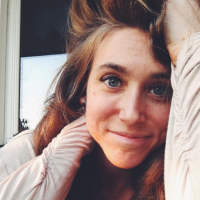
A few years ago, one morning when I was out walking, I had a thought that triggered a sort of identity crisis for me.
I had been talking to myself, trying to figure out how to write a certain article, when I had the thought, “I don’t want to write this.”
I don’t want to write this.
I don’t want to write this.
I don’t want to write this.
And then: I don’t want to be a writer.
This last one jolted me—because I had always considered myself “a writer.” I was a writer.
Throughout my life, I always knew that I was a writer, that I was good at it. No matter what I was doing in life or what was happening in life or how I felt about anything else, I always knew that I had writing—that I was a writer.
If I wasn’t a writer? Who was I?
This thought, this experience, really made me think, wonder, question, ponder.
Of course, now I write, and I love it—but I no longer define myself by it.
That moment years ago showed me the importance of not clinging to ideas we hold of ourselves—even the things we take to be the most certain, the things we think we “know,” that we take for granted that we “know.”
Rigidly defining ourselves or clinging to any definition we have of ourselves limits our ability to shift, change, and expand—to be who we are in each moment—and it can cause us tension or suffering if we go through periods that cause us to question those beliefs we have of ourselves.
We all view ourselves in certain ways and that’s natural, but it’s also something we should hold loosely and be willing to question.
I think almost all of us create stories about who we are and probably do this in ways that we aren’t fully conscious of. We have our self-concept, our self-identity, wrapped up in so many things, things we may not even be aware of. And we can hold so tightly to how we see ourselves that it can be difficult for us to accept that things have changed, that we no longer resonate with certain things, like certain things, that maybe, we are different and want different things.
It would feel so much better to just effortlessly flow with what feels right in the moment, to move toward what feels good, and to gently let go of what no longer does. But there are a lot of reasons for why we do what we do, and this includes an attachment to how we may see ourselves.
To live in alignment with who we are in each changing moment, we have to be present with ourselves.
We have to be willing to be honest with ourselves.
We have to be willing to detach from the images we hold of ourselves.
We have to be able to see the parts that we’re clinging to and question whether they still feel good or right to us.
And we have to be willing to move with what does feel good and right to us, right now.
We all have a self-identity. We all see ourselves in a certain way.
This is natural, but it can also be limiting. And the more we can detach from this and settle into our present, into who we are in this moment, the more peace and ease we’ll feel.
That moment years ago showed me the importance of not rigidly defining ourselves, in being able to detach from how we view ourselves. It’s a practice and a journey.
I love writing, but I don’t always want to do it. And I’m okay with the fact that I go through periods when I don’t want to do it at all.
I know that writing is a part of me, that it’s a part of my purpose, that it flows through me because something wants to speak through me, that a part of me has to write—but I also know that it is not who I am.
~
 Share on bsky
Share on bsky





Read 10 comments and reply